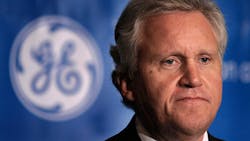General Electric is officially headed across the border with a move that delivers a shot in the arm to manufacturing in Ontario and a major blow to Wisconsin and the Export-Import Bank.
GE announced Friday morning that it will break ground on a new Brilliant Factory in Welland, Ontario, almost one year after news broke that the industrial giant would close its engine factory in Waukesha, Wisconsin. GE blamed Congress at the time for failing to reauthorize the Export-Import Bank.
Located about 15 miles southwest of Niagara Falls, the factory will be dedicated to production of energy-efficient reciprocating gas engines and utilize the industrial Internet of Things along with other GE smart technology. The 450,000-square-foot factory is expected to employ about 220 people by the end of 2020. GE Canada president Elyse Allan is optimistic that number could grow with factory expansion.
About 80% of the factory’s production will be for export, according to a company news release, and export financing remains at the center of the shift from Wisconsin to Ontario. When GE announced the move in late September, Congress had not reauthorized the Export-Import Bank; it remains unable to approve transactions of more than $10 million.
In turn, Ontario provided a $20.5 million Canadian grant, and Export Development Canada offered support for global transactions. “In part,” Allan said in an interview with The National Post, “we were looking at Canada because of the great relationship we have with the EDC.”
GE is just the latest company to invest in Canada in general, and in Ontario in particular: General Motors will create about 700 jobs with technical center enhancements in Oshawa; Fiat Chrysler Automobiles will manufacture the first plug-in hybrid minivan in Windsor; Google has created 400 jobs in and around Waterloo over the last decade and has the capacity to add another 600; and IBM has helped local SMEs launch and market new tech and products.
In Wisconsin, a 110-year-old factory acquired by GE Power & Energy in 2010 and 350 workers are the collateral damage in an export struggle that continues to drag.
The Waukesha Motor Company traces its history in the city to 1906. About 600 people worked at the factory in the Milwaukee suburb. The closure will take place over the next couple years, with about 250 jobs in engineering and administration not expected to be eliminated.
“We believe in American manufacturing, but our customers in many cases require Export Credit Agencies financing for us to bid on projects,” GE vice chairman John Rice said in a statement following the September announcement of the Wisconsin factory. “Without it, we cannot compete, and our customers may be forced to select other providers.
“We know these announcements will have regrettable impact not only on our employees but on the hundreds of U.S. suppliers we work with that cannot move their facilities, but we cannot walk away from our customers.”
When the Export-Import Bank charter was reauthorized in 2012, six of the 10 members of Wisconsin’s congressional delegation voted in favor — all four Democrats, and two of the six Republicans. One of the two Republicans was freshman House member Reid Ribble, who told the Milwaukee Journal-Sentinel he wasn’t surprised by GE’s decision, and that he supports the bank because many competing nations — like Canada — have equivalent import-export financing.
“We can’t just unilaterally withdraw in a global economy,” Ribble told the Journal-Sentinel. “It would be a withdrawal for ideological reasons. Conservatives have this ideology that government should leave it to the private sector, but there are types of exports where the private sector won’t pick up the financing of that business. Companies will be forced to leave the country and take jobs to countries where there is export-import bank financing if we don't offer it.”
About the Author
Matt LaWell
Staff Writer
Staff writer Matt LaWell explores news in manufacturing technology, covering the trends and developments in automation, robotics, digital tools and emerging technologies. He also reports on the best practices of the most successful high tech companies, including computer, electronics, and industrial machinery and equipment manufacturers.
Matt joined IndustryWeek in 2015 after six years at newspapers and magazines in West Virginia, North Carolina and Ohio, a season on the road with his wife writing about America and minor league baseball, and three years running a small business. He received his bachelor's degree in magazine journalism from Ohio University.
